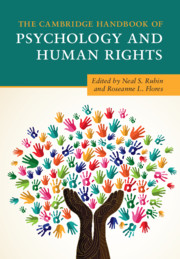Book contents
- The Cambridge Handbook of Psychology and Human Rights
- The Cambridge Handbook of Psychology and Human Rights
- Copyright page
- Dedication
- Contents
- Figures
- Tables
- Boxes
- Contributors
- Acknowledgments
- The Core International Human Rights Instruments and Their Monitoring Bodies
- Universal Human Rights Instruments
- Sustainable Development Goals
- Glossary of United Nations and Psychology Acronyms in the Handbook
- Introduction
- Part I History of Human Rights
- Part II The Intersection of Psychology and Human Rights
- Part III Contemporary Issues in Psychology and Human Rights
- 12 Mental Health and Human Rights
- 13 Cultivating Our Common Humanity
- 14 From Refugees to Immigrants
- 15 UN Convention on the Rights of the Child and the Sustainable Development Goals
- 16 The Global Contributions of Psychology to Understanding and Addressing the Non-negotiability of Human Dignity and Health Equity
- 17 Human Rights and Psychology from Indigenous Perspectives
- 18 Human Trafficking
- 19 Human Rights Seen through a Cultural Lens
- 20 Human Rights and Well-Being of Older Persons
- 21 Reproductive Justice, Psychology, and Human Rights
- 22 Psychology and the Global Human Rights Agenda on Sexual Orientation and Gender Identity
- 23 Psychosocial Features of Movements That Have Advanced Human Rights
- 24 Principles of Care of Survivors of Organized Violence in a Global Society
- 25 Mental Health and Psychosocial Support in Humanitarian Settings
- 26 Children and Violence across the Life Span
- 27 Psychology and Human Rights in the Age of Genomics and Neuroscience
- 28 Behavioral Insights, Public Policy, and Human Rights
- 29 From Human Resources to Human Rights
- 30 Climate Change
- Part IV Teaching, Research, and Training in Psychology and Human Rights
- Part V Future Directions
- Index
- References
16 - The Global Contributions of Psychology to Understanding and Addressing the Non-negotiability of Human Dignity and Health Equity
from Part III - Contemporary Issues in Psychology and Human Rights
Published online by Cambridge University Press: 02 October 2020
- The Cambridge Handbook of Psychology and Human Rights
- The Cambridge Handbook of Psychology and Human Rights
- Copyright page
- Dedication
- Contents
- Figures
- Tables
- Boxes
- Contributors
- Acknowledgments
- The Core International Human Rights Instruments and Their Monitoring Bodies
- Universal Human Rights Instruments
- Sustainable Development Goals
- Glossary of United Nations and Psychology Acronyms in the Handbook
- Introduction
- Part I History of Human Rights
- Part II The Intersection of Psychology and Human Rights
- Part III Contemporary Issues in Psychology and Human Rights
- 12 Mental Health and Human Rights
- 13 Cultivating Our Common Humanity
- 14 From Refugees to Immigrants
- 15 UN Convention on the Rights of the Child and the Sustainable Development Goals
- 16 The Global Contributions of Psychology to Understanding and Addressing the Non-negotiability of Human Dignity and Health Equity
- 17 Human Rights and Psychology from Indigenous Perspectives
- 18 Human Trafficking
- 19 Human Rights Seen through a Cultural Lens
- 20 Human Rights and Well-Being of Older Persons
- 21 Reproductive Justice, Psychology, and Human Rights
- 22 Psychology and the Global Human Rights Agenda on Sexual Orientation and Gender Identity
- 23 Psychosocial Features of Movements That Have Advanced Human Rights
- 24 Principles of Care of Survivors of Organized Violence in a Global Society
- 25 Mental Health and Psychosocial Support in Humanitarian Settings
- 26 Children and Violence across the Life Span
- 27 Psychology and Human Rights in the Age of Genomics and Neuroscience
- 28 Behavioral Insights, Public Policy, and Human Rights
- 29 From Human Resources to Human Rights
- 30 Climate Change
- Part IV Teaching, Research, and Training in Psychology and Human Rights
- Part V Future Directions
- Index
- References
Summary
Human dignity is inextricably tied to health equity. In the past quarter century, concerns about widening health inequalities and inequities have increased worldwide. Highlighting this concern is the fact that the Sustainable Development Goals include one health goal and more than fifty health-related targets that are applicable to all countries. Psychology, with an understanding of the importance of the person–environment interaction, can help to meaningfully address health equity and promote the sustainable development goals of the UN 2030 Agenda. In this chapter, we focus on the contributions of psychology to promoting health equity and dignity, and well-being overall, highlighting pertinent research surrounding maternal health, HIV/AIDS, and mental health and well-being.
Keywords
- Type
- Chapter
- Information
- The Cambridge Handbook of Psychology and Human Rights , pp. 243 - 257Publisher: Cambridge University PressPrint publication year: 2020
References
- 1
- Cited by

